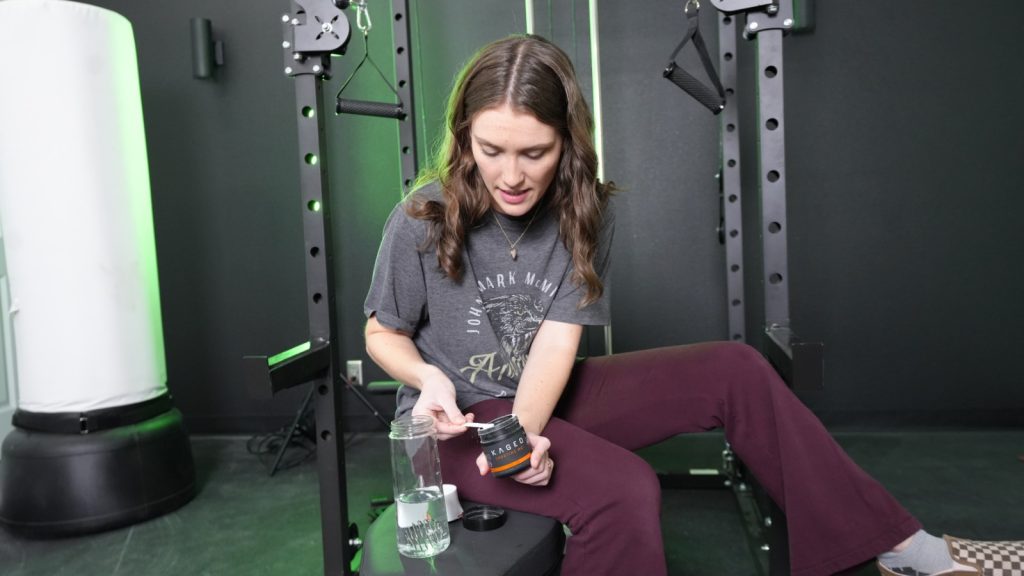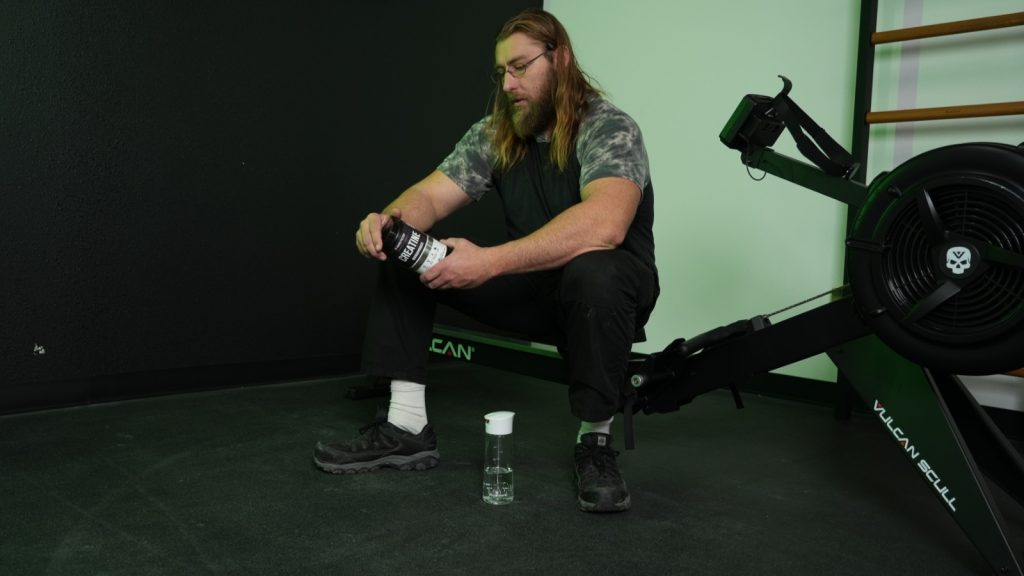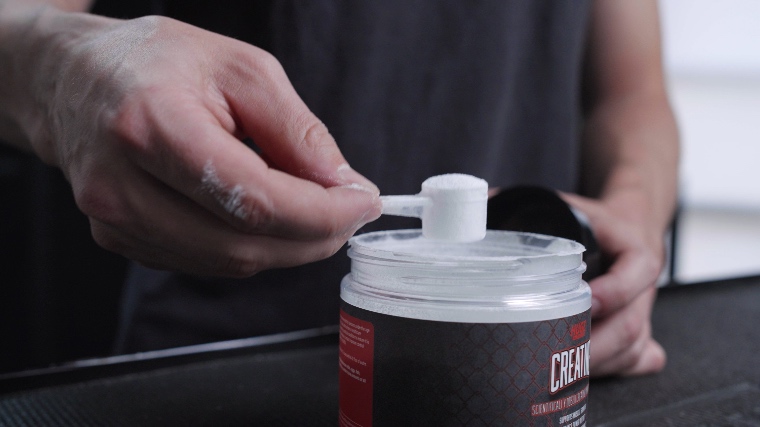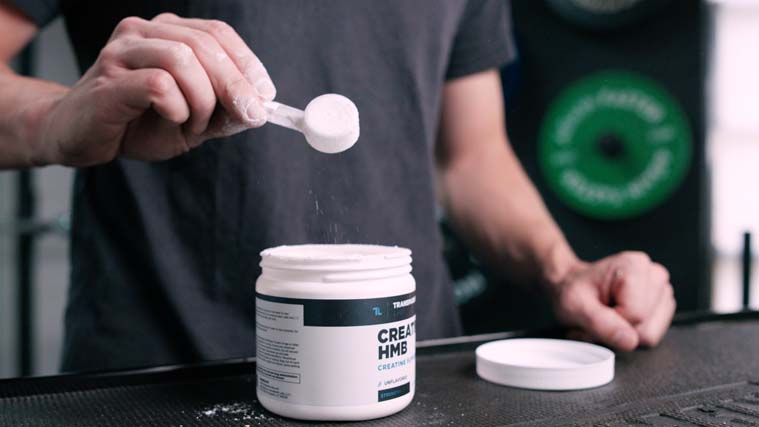Dietary supplements are a dime a dozen, often collecting your hard-earned cash without delivering their promised value. However, there are those rare, shiny coins like the best creatine supplements that truly hold up their end of the bargain. Oh, and creatine is highly cost-effective.
Sounds too good to be true, right? Well, research supports that creatine can enhance your muscle gains, physical performance, and brain health — and that’s just scratching the surface. (1) But is there another side of the coin we should worry about with creatine supplements? For most healthy individuals, not really, but it’s still worth acknowledging. So, if you want to cash in on the many creatine benefits, here’s exactly what to know.
Key Takeaways
- Creatine is a natural energy source that helps your muscles flex, which supports muscle. growth, exercise performance, and brain health. It is generally considered to be safe. (1)
- 95% of your body’s creatine is stored in the muscles, and the rest is stored in other tissues like the heart, brain, and testes. (2)
- Studies show that 28% of people use or have used creatine supplements, 90% of whom are physically active. (3)
- When you take creatine, it takes anywhere from 5 to 28 days to see a change in your energy levels. (4)
- Studies have shown that adults can add about two pounds of lean body mass when supplementing with creatine. (5)
Editor’s Note: The content on BarBend is meant to be informative in nature, but it should not be taken as medical advice. When starting a new training regimen and/or diet, it is always a good idea to consult with a trusted medical professional. We are not a medical resource. The opinions and articles on this site are not intended for use as diagnosis, prevention, and/or treatment of health problems. They are not substitutes for consulting a qualified medical professional.
Potential Benefits of Creatine
So, how is creatine good for you? Due to how it functions in the body, creatine offers numerous benefits.

Stored in muscle cells as creatine phosphate or phosphocreatine, creatine helps create and replenish ATP (adenosine triphosphate — the primary energy source for our body’s cells) for energy. (6) This process enhances athletic performance, increases strength, and promotes muscle mass growth, among other benefits.
May Increase Strength and Power
Creatine supplements are highly recommended for strength and power athletes since they boost ATP and energy. Maximizing muscle creatine levels can enhance performance in repetitive, high-intensity exercise by up to 20 percent, leading to faster sprints, heavier lifts, more reps, and long-term gains. (1)
Research shows that combining creatine with a resistance training program significantly boosts strength in leg press and chest press, as well as overall body strength. (7)(8)
May Increase Muscle Mass
Building muscle starts in the gym, where resistance training causes damage to muscle fibers. During recovery, your body repairs and fuses these fibers, increasing muscle size though hypertrophy. Over 35 studies have shown that adults of all ages can gain an average of two pounds of lean body mass with creatine supplementation. (5)

Cisgender men tend to see greater gains than cisgender women, who typically have 70 to 80 percent lower creatine storage levels. Furthermore, research on women is limited, and no studies currently address how trans women, trans men, and nonbinary individuals respond to creatine. (9)
Research spanning 50 years shows that creatine supplements, combined with training, effectively increase lean body mass and muscle strength for both cisgender men and women. (10) The combination also shows promise for treating muscle loss in older adults with sarcopenia and patients with cancer, kidney disease, and heart failure. (10) Of course, it’s always important to speak to a physician before starting any new supplement.
May Improve Recovery
Creatine can enhance post-exercise recovery by reducing muscle damage and improving muscle function after exhaustive exercise. (6)(11) Studies show that creatine significantly lowers creatine kinase (CK) levels, a marker of muscle damage, within the first 24 to 96 hours post-exercise. (12)
Training also depletes glycogen stores, and replenishing them is crucial for muscle recovery. Ingesting creatine with carbohydrates — an important fuel for high-intensity aerobic exercise — before working out restores muscle glycogen more effectively than carbohydrates alone, highlighting its role in recovery. (1)
May Prevent Injury
The use of creatine might help prevent injuries, lessen their severity, and improve rehabilitation. (11) It could also reduce the impact of traumatic brain and spinal cord injuries, leading the ISSN (International Society Of Sports Nutrition) to recommend it for all high-risk athletes. (1)

In a study of college football players during a 12-week off-season training period, those who took creatine experienced fewer cramps, muscle tightness, strains, pulls, and non-contact injuries than those who didn’t take it. (1)
May Boost Brain Health
The brain uses about 20 percent of the body’s total resting energy, and neurons (nerve cells) require a steady supply of ATP. Supplementing with creatine can increase brain creatine content by up to 15 percent, potentially enhancing ATP production and leading to cognitive benefits. (13)
Research underscores the importance of creatine for cognitive function, especially for those with creatine deficiency, which lowers brain creatine levels. Vegetarians, who typically have lower creatine levels due to diet, show to significantly improve memory and intelligence test scores after taking creatine supplements. (14)
Creatine supplementation may also benefit those with neurological diseases such as muscular dystrophy, Huntington’s disease, and Parkinson’s disease. Additionally, creatine could aid in managing various forms of depression and anxiety, contributing to improved mental health. (15)
Natural
Creatine is a naturally occurring compound created by amino acids — specifically arginine, glycine, and methionine — in the kidneys, liver, and pancreas. About 95 percent of creatine is stored in skeletal muscles, while the rest is found in tissues like the heart, brain, and testes. (2)
Is Creatine Worth All the Hype?
We absolutely believe creatine is worth the hype. But remember, you’ll still need to put in the work — fuel properly, train hard, recover harder, rinse, and repeat. Here’s why creatine, monohydrate, in particular, is so celebrated:
- Proven Effectiveness: The ISSN recognizes creatine monohydrate as the top ergogenic supplement (a supplement that may enhance physical performance and recovery) for athletes. (1)
- Health Benefits: Beyond performance and bodybuilding, creatine monohydrate benefits overall health — it may aid in injury prevention and improve brain health.
- Safety and Affordability: When taken in appropriate dosages, 3 to 5 grams daily, creatine monohydrate is safe to use. (1) It’s also a budget-friendly option compared to other supplements.
What Is Creatine?
Creatine is a natural compound your body creates from amino acids, primarily stored in your skeletal muscles. Creatine synthesis, the body’s natural process of producing creatine from amino acids, covers about half of our daily needs. The rest must be obtained through creatine-rich foods or supplements. (2)
Dietary Sources of Creatine
You can obtain creatine from various dietary sources, particularly red meat and seafood. Foods with creatine include:
- Almonds
- Chicken
- Cod
- Ground beef
- Herring
- Parmesan cheese
- Pumpkin seeds
- Salmon
- Sesame seeds
- Steak
- Tuna
- Walnuts
Common Forms of Creatine
Supplemental creatine comes in various forms, each with unique properties. Some of the most common types of creatine and their notable differences include:
- Creatine Monohydrate: This is creatine bonded to a water molecule. It is the most common, extensively researched, and cost-effective form, highly effective at boosting intramuscular creatine levels. (1)
- Creatine Ethyl Ester: This creatine is attached to ester salts, and is believed to enhance bioavailability and creatine stores in the muscle. (16)(17)
- Creatine Hydrochloride (HCl): Combines creatine with hydrochloride molecules to be more acidic and soluble in water. Claimed creatine HCl benefits include greater biovability, absorption, and solubility. (17)
- Creatine Magnesium Chelate: This form combines creatine with magnesium, claiming better absorption. (16)
- Creatine Phosphate: Stored directly in muscle tissue, this form powers muscular contractions through rapid ATP regeneration. (16)
Despite claims of better solubility and absorption, there is no evidence that alternative creatine forms are superior to creatine monohydrate, which remains the most studied and cost-effective option. (16)
Creatine Safety
Creatine is considered safe for most healthy individuals, endorsed by the ISSN and FDA as “generally recognized as safe” (GRAS). (1)(18) However, to avoid potential issues, it’s essential to adhere to recommended dosages and usage guidelines.
- Dosage: Though up to 30 grams of creatine daily for five years appears safe, a recommended daily dose is 3 to 5 grams (or about 0.1 grams per kilogram of body weight) for effective results. (1)
- Form: We recommend you stick with creatine monohydrate and use other forms cautiously, as more research is needed to establish their potential creatine supplement benefits and risks.
- Testing: Opt for third-party tested supplements to ensure pure ingredients free of harmful additives and banned substances.
- Certain Populations: Individuals with pre-existing kidney or liver diseases, pregnant and lactating women, and children and adolescents should consult their healthcare provider before taking.
Creatine Myths
Creatine is a popular topic in fitness, but misinformation often surrounds it. Let’s dive in and debunk some of the most common myths about creatine.
Creatine Is a Steroid
Contrary to popular belief, creatine is not a steroid. While both creatine and steroids may enhance performance, they do so through different mechanisms and come with distinct legal statuses and safety profiles.

Anabolic steroids are classified as a Class III, Schedule C controlled substance regulated by the FDA, making them illegal without a prescription. On the other hand, creatine is a legal dietary supplement with no restrictions on possession or use. (18)
Creatine Will Give Me Abs
Just taking creatine won’t grant you abs, but it can give you an edge during ab workouts and promote muscle growth. To reveal those abdominal muscles, you’ll need to lower your body fat percentage, which is best achieved through smart nutrition and dedicated core training.
Creatine Causes Hair Loss and Baldness
While there have been widespread claims that creatine can cause hair loss, no scientific study has confirmed that creatine leads to hair loss or baldness in humans. (18)
Potential Drawbacks of Creatine
Everyone responds differently to supplements, and creatine is no exception. While mostly beneficial, potential creatine side effects and drawbacks should be noted.
May Cause Gastrointestinal Distress
Some users report experiencing gastrointestinal issues, including stomach discomfort, diarrhea, and bloating. These symptoms, particularly diarrhea, tend to become more severe at doses exceeding 10 grams. However, the specific form of creatine causing these issues is not specified. (18)
May Interact With Caffeine
The interaction between creatine and caffeine and their impact on workout performance remains a topic of debate. A 2022 review found that while creatine loading phase does not interfere with the immediate effects of caffeine, chronic caffeine intake during creatine loading might reduce creatine benefits. Combining these supplements may cause gastrointestinal distress, so consider timing the dose. (19)
Not FDA Approved
While creatine is generally safe, remember that it’s not FDA-approved, like all dietary supplements. Athletes, particularly those under NCAA and IOC supervision, should exercise caution with any dietary supplement due to the risk of contamination, especially in mixed products. (6)
Natural Energy Booster
Creatine supplements enhance your muscles’ phosphocreatine stores, essential for producing the body’s primary energy molecule known as ATP. By increasing phosphocreatine levels, creatine helps generate more ATP, providing the energy needed for high-intensity activities and improving overall performance. (6)

Additionally, supplementing with creatine can boost brain creatine content, potentially enhancing ATP production and cognitive function. (13)(14)
FAQs: Creatine Benefits
Does creatine benefit runners?
Creatine mainly benefits runners in short, intense efforts like sprints and jumping. While it may not directly impact longer distances, its strength and power benefits can still improve overall running performance. (11)
Is it ok to take creatine everyday?
Absolutely. In fact, it is recommended that you take creatine every day to maintain your creatine levels. The standard daily dosage is three to five grams, and you can take it at any time that suits you best. (1)
What are the potential downsides to taking creatine?
The primary adverse effect of creatine supplementation is short-term water retention, which may lead to temporary weight gain. Exceeding 10 grams of creatine may also cause digestive issues like diarrhea. (18)
What are the benefits of creatine for women?
Creatine benefits women similarly to men, enhancing phosphocreatine levels to improve exercise performance and recovery. In postmenopausal women, combining creatine and strength training may improve body composition and bone density. Additionally, creatine may improve mood and cognitive function, offering overall health and well-being benefits. (9)
References
- Kreider, R. B., Kalman, D. S., Antonio, J., Ziegenfuss, T. N., Wildman, R., Collins, R., Candow, D. G., Kleiner, S. M., Almada, A. L., & Lopez, H. L. (2017). International Society of Sports Nutrition position stand: safety and efficacy of creatine supplementation in exercise, sport, and medicine. Journal of the International Society of Sports Nutrition, 14, 18. https://doi.org/10.1186/s12970-017-0173-z
- Kreider, R. B., & Stout, J. R. (2021). Creatine in Health and Disease. Nutrients, 13(2), 447. https://doi.org/10.3390/nu13020447
- Benton, M. J., Spicher, J. M., & McCormick, S. (2021). Community-Based Survey Exploring Use of the Dietary Supplement Creatine by Adult Non-Athletes. Nutrients, 13(8), 2529. https://doi.org/10.3390/nu13082529
- Ribeiro, F., Longobardi, I., Perim, P., Duarte, B., Ferreira, P., Gualano, B., Roschel, H., & Saunders, B. (2021). Timing of Creatine Supplementation around Exercise: A Real Concern?. Nutrients, 13(8), 2844. https://doi.org/10.3390/nu13082844
- Delpino, F. M., Figueiredo, L. M., Forbes, S. C., Candow, D. G., & Santos, H. O. (2022). Influence of age, sex, and type of exercise on the efficacy of creatine supplementation on lean body mass: A systematic review and meta-analysis of randomized clinical trials. Nutrition (Burbank, Los Angeles County, Calif.), 103-104, 111791. https://doi.org/10.1016/j.nut.2022.111791
- Hall, M., Manetta, E., & Tupper, K. (2021). Creatine Supplementation: An Update. Current sports medicine reports, 20(7), 338–344. https://doi.org/10.1249/JSR.0000000000000863
- Mills, S., Candow, D. G., Forbes, S. C., Neary, J. P., Ormsbee, M. J., & Antonio, J. (2020). Effects of Creatine Supplementation during Resistance Training Sessions in Physically Active Young Adults. Nutrients, 12(6), 1880. https://doi.org/10.3390/nu12061880
- Rawson, E. S., & Volek, J. S. (2003). Effects of creatine supplementation and resistance training on muscle strength and weightlifting performance. Journal of strength and conditioning research, 17(4), 822–831. https://doi.org/10.1519/1533-4287(2003)017<0822:eocsar>2.0.co;2
- Smith-Ryan, A. E., Cabre, H. E., Eckerson, J. M., & Candow, D. G. (2021). Creatine Supplementation in Women’s Health: A Lifespan Perspective. Nutrients, 13(3), 877. https://doi.org/10.3390/nu13030877
- Wu, S. H., Chen, K. L., Hsu, C., Chen, H. C., Chen, J. Y., Yu, S. Y., & Shiu, Y. J. (2022). Creatine Supplementation for Muscle Growth: A Scoping Review of Randomized Clinical Trials from 2012 to 2021. Nutrients, 14(6), 1255. https://doi.org/10.3390/nu14061255
- Wax, B., Kerksick, C. M., Jagim, A. R., Mayo, J. J., Lyons, B. C., & Kreider, R. B. (2021). Creatine for Exercise and Sports Performance, with Recovery Considerations for Healthy Populations. Nutrients, 13(6), 1915. https://doi.org/10.3390/nu13061915
- Jiaming, Y., & Rahimi, M. H. (2021). Creatine supplementation effect on recovery following exercise-induced muscle damage: A systematic review and meta-analysis of randomized controlled trials. Journal of food biochemistry, 45(10), e13916. https://doi.org/10.1111/jfbc.13916
- Forbes, S. C., Cordingley, D. M., Cornish, S. M., Gualano, B., Roschel, H., Ostojic, S. M., Rawson, E. S., Roy, B. D., Prokopidis, K., Giannos, P., & Candow, D. G. (2022). Effects of Creatine Supplementation on Brain Function and Health. Nutrients, 14(5), 921. https://doi.org/10.3390/nu14050921
- Rae, C., Digney, A. L., McEwan, S. R., & Bates, T. C. (2003). Oral creatine monohydrate supplementation improves brain performance: a double-blind, placebo-controlled, cross-over trial. Proceedings. Biological sciences, 270(1529), 2147–2150. https://doi.org/10.1098/rspb.2003.2492
- Roschel, H., Gualano, B., Ostojic, S. M., & Rawson, E. S. (2021). Creatine Supplementation and Brain Health. Nutrients, 13(2), 586. https://doi.org/10.3390/nu13020586
- Fazio, C., Elder, C. L., & Harris, M. M. (2022). Efficacy of Alternative Forms of Creatine Supplementation on Improving Performance and Body Composition in Healthy Subjects: A Systematic Review. Journal of strength and conditioning research, 36(9), 2663–2670. https://doi.org/10.1519/JSC.0000000000003873
- Escalante, G., Gonzalez, A. M., St Mart, D., Torres, M., Echols, J., Islas, M., & Schoenfeld, B. J. (2022). Analysis of the efficacy, safety, and cost of alternative forms of creatine available for purchase on Amazon.com: are label claims supported by science?. Heliyon, 8(12), e12113. https://doi.org/10.1016/j.heliyon.2022.e12113
- Antonio, J., Candow, D. G., Forbes, S. C., Gualano, B., Jagim, A. R., Kreider, R. B., Rawson, E. S., Smith-Ryan, A. E., VanDusseldorp, T. A., Willoughby, D. S., & Ziegenfuss, T. N. (2021). Common questions and misconceptions about creatine supplementation: what does the scientific evidence really show?. Journal of the International Society of Sports Nutrition, 18(1), 13. https://doi.org/10.1186/s12970-021-00412-w
- Elosegui, S., López-Seoane, J., Martínez-Ferrán, M., & Pareja-Galeano, H. (2022). Interaction Between Caffeine and Creatine When Used as Concurrent Ergogenic Supplements: A Systematic Review. International journal of sport nutrition and exercise metabolism, 32(4), 285–295. https://doi.org/10.1123/ijsnem.2021-0262